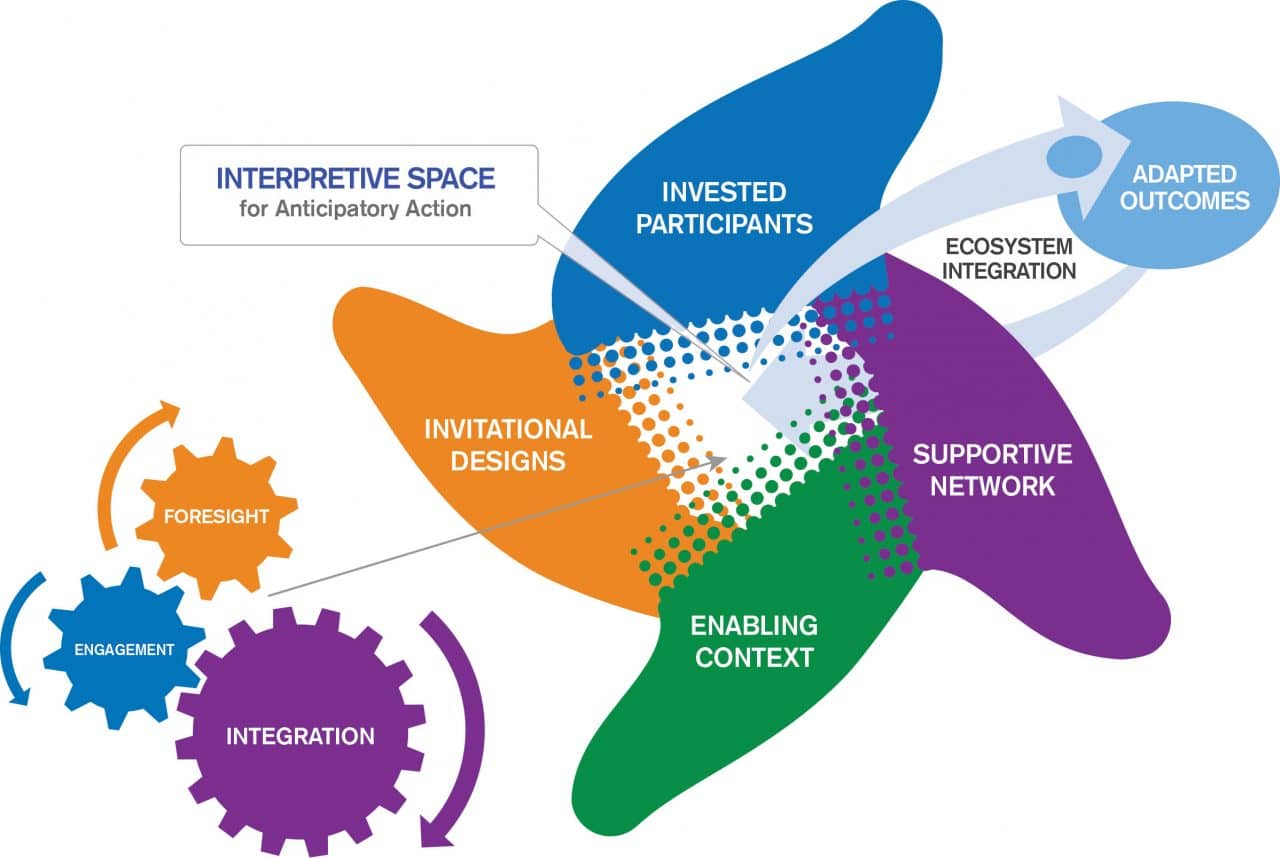Continua após a publicidade
Em uma era em que os limites entre biologia e tecnologia estão cada vez mais confusos, o conceito de uma evolução impulsionada pela tecnologia não está mais confinado ao reino da ficção científica. Essa mudança de paradigma nos leva a reexaminar nossa compreensão do futuro da humanidade. A fusão de biotecnologia avançada e inovação digital tem o potencial de remodelar o que significa ser humano. Como resultado, a própria natureza da evolução está sendo redefinida por pioneiros no campo, incluindo figuras renomadas como Ray Kurzweil e Jennifer Doudna, cujo trabalho inovador em inteligência artificial e edição genética CRISPR, respectivamente, preparou o cenário para avanços sem precedentes. 🌐
Com mais de 15 anos de experiência em escrita científica e doutorado em Biotecnologia, pretendo guiá-lo por esse cenário intrincado. Nossa exploração se aprofundará em como essas inovações tecnológicas não são meramente ferramentas, mas forças transformadoras que podem inaugurar uma nova era de evolução humana. As implicações desses desenvolvimentos se estendem além da comunidade científica, alcançando os reinos da ética, filosofia e normas sociais. A questão que se impõe é: estamos preparados para abraçar um futuro em que nossos limites biológicos são ditados por avanços tecnológicos?
Continua após a publicidade
À medida que viajamos pela intrincada tapeçaria de futuros potenciais, é crucial para cada um de nós considerar nosso papel e responsabilidade em moldar essa nova humanidade. Como a sociedade equilibrará os benefícios potenciais com os dilemas éticos que surgem da manipulação do próprio tecido da vida? As respostas são tão complexas quanto as próprias tecnologias, mas se envolver com essas questões é fundamental para promover um futuro que se alinhe com nossos valores e aspirações coletivas.
Junte-se a nós enquanto desvendamos as possibilidades e os desafios que temos pela frente, convidando você a se envolver com o conteúdo criticamente e refletir sobre sua própria perspectiva. A interação entre evolução e tecnologia não é apenas uma investigação científica; é um diálogo que envolve todos nós. Estamos à beira de criar uma nova humanidade ou estamos apenas testemunhando outro capítulo na saga contínua de adaptação e inovação humana? O futuro aguarda, e sua percepção é inestimável para navegar neste território desconhecido. 🚀
Continua após a publicidade
O futuro da evolução: a tecnologia pode criar uma nova humanidade?
A intersecção da evolução e da tecnologia
A ideia de evolução é frequentemente associada aos processos lentos e naturais que moldaram a vida na Terra ao longo de milhões de anos. No entanto, à medida que a tecnologia continua a avançar em ritmo acelerado, estamos começando a explorar como ela poderia potencialmente acelerar ou até mesmo redirecionar o curso da evolução humana. 🌍💡
No centro desta discussão está o conceito de “transumanismo” — a crença de que os humanos podem evoluir além de suas atuais limitações físicas e mentais por meio do uso da tecnologia. Mas a tecnologia pode realmente criar uma nova humanidade? Vamos nos aprofundar nessa questão intrigante.
Compreendendo o Transumanismo
Transhumanismo é mais do que apenas ficção científica; é um movimento que busca aprimorar as capacidades humanas por meio de tecnologia avançada. Isso pode significar estender a expectativa de vida, aprimorar as habilidades cognitivas ou até mesmo redesenhar nossos corpos para melhor atender aos nossos desejos ou necessidades.

Conceitos-chave no Transumanismo
- Extensão da vida: Tecnologias como engenharia genética, nanotecnologia e medicina regenerativa visam aumentar significativamente a expectativa de vida humana.
- Inteligência Aumentada: Interfaces cérebro-computador e integração de IA propõem impulsionar as funções cognitivas humanas muito além das capacidades atuais.
- Melhoria física: O uso de próteses e exoesqueletos para melhorar habilidades físicas, potencialmente levando à força ou resistência sobre-humanas.
Considerações éticas
Embora as possibilidades pareçam infinitas, a jornada em direção a uma nova humanidade por meio da tecnologia é repleta de dilemas éticos. Como garantimos que esses avanços sejam acessíveis a todos e não apenas a alguns privilegiados? Isso poderia levar a uma nova forma de desigualdade?
Perguntas para refletir
- Quem regulará o uso de tecnologias de aprimoramento humano?
- Como abordamos a potencial perda de diversidade se todos buscam a forma humana “ideal”?
- Quais são as implicações para a identidade pessoal e a essência do que significa ser humano?
Exemplos do mundo real
Já vemos vislumbres de como a tecnologia está remodelando nossa evolução. Considere CRISPR, uma tecnologia de edição genética que tem o potencial de eliminar doenças genéticas. Ou pense em como membros protéticos estão se tornando cada vez mais avançados, oferecendo não apenas substituição, mas aprimoramento.
Estudos de caso
– CRISPR e edição genética: Pesquisadores estão explorando como o CRISPR pode ser usado não apenas para curar doenças, mas também para melhorar características humanas, como inteligência ou destreza física.
– Próteses e Exoesqueletos: Empresas como a Ekso Bionics estão desenvolvendo exoesqueletos que permitem que indivíduos com paralisia andem novamente, demonstrando o potencial para futuras melhorias físicas.
Riscos e desafios potenciais
A rápida integração da tecnologia em nosso caminho evolutivo não é isenta de desafios. Uma grande preocupação são os efeitos de longo prazo que essas tecnologias podem ter no genoma humano e nas estruturas sociais.
Possíveis riscos
- Consequências genéticas não intencionais podem surgir de modificações genéticas.
- A privacidade e a autonomia podem ser comprometidas com o surgimento das interfaces cérebro-computador.
- Ruptura social devido a disparidades no acesso a tecnologias de aprimoramento.
Perguntas frequentes
A tecnologia pode realmente alterar o curso da evolução humana?
Sim, até certo ponto. Enquanto a evolução tradicional é um processo lento influenciado pela seleção natural, a tecnologia permite mudanças mais rápidas que podem ser direcionadas intencionalmente. No entanto, isso levanta questões sobre a naturalidade e a desejabilidade de tais mudanças.
Qual o papel das políticas públicas nesse futuro?
A política pública será crucial na regulamentação do uso ético de tecnologias de aprimoramento humano, garantindo acesso equitativo e protegendo os direitos e liberdades dos indivíduos. Os formuladores de políticas precisarão trabalhar em estreita colaboração com cientistas, eticistas e o público para navegar nessas águas desconhecidas.
Resumindo
O futuro da evolução está cada vez mais entrelaçado com avanços tecnológicos, oferecendo oportunidades sem precedentes e desafios significativos. À medida que nos aproximamos desta nova era, é crucial considerar não apenas o que é possível, mas também o que é ético, desejável e sustentável para o futuro da humanidade. 🌱🚀
Conclusão
Concluindo, “The Future of Evolution: Can Technology Create a New Humanity?” explora o potencial transformador da tecnologia na formação do futuro da evolução humana. Por meio de um exame meticuloso dos avanços atuais em biotecnologia, inteligência artificial e engenharia genética, a discussão destaca as imensas oportunidades e os desafios éticos que temos pela frente. À medida que nos aproximamos de uma nova era em que a tecnologia pode redefinir o que significa ser humano, é crucial abordar esses desenvolvimentos com uma perspectiva equilibrada, garantindo que a inovação seja guiada por considerações éticas e necessidades sociais.
O artigo enfatiza que, embora a tecnologia mantenha a promessa de capacidades aprimoradas e qualidade de vida melhorada, ela também levanta questões sobre identidade, equidade e o curso natural da evolução. Como partes interessadas nessa narrativa em desenvolvimento, é imperativo que cientistas, formuladores de políticas e o público se envolvam em diálogos ponderados e esforços colaborativos para direcionar esses avanços em uma direção que beneficie toda a humanidade.
Refletindo sobre esses temas, convidamos você a considerar: Como podemos aproveitar responsavelmente o poder tecnológico para enriquecer a evolução humana, ao mesmo tempo em que salvaguardamos nossos valores essenciais e diversidade? Seus insights e engajamento são vitais à medida que navegamos coletivamente nesta jornada transformadora. Obrigado por se juntar a nós nesta exploração do futuro — um futuro onde a fusão de tecnologia e humanidade tem potencial ilimitado. 🌟




